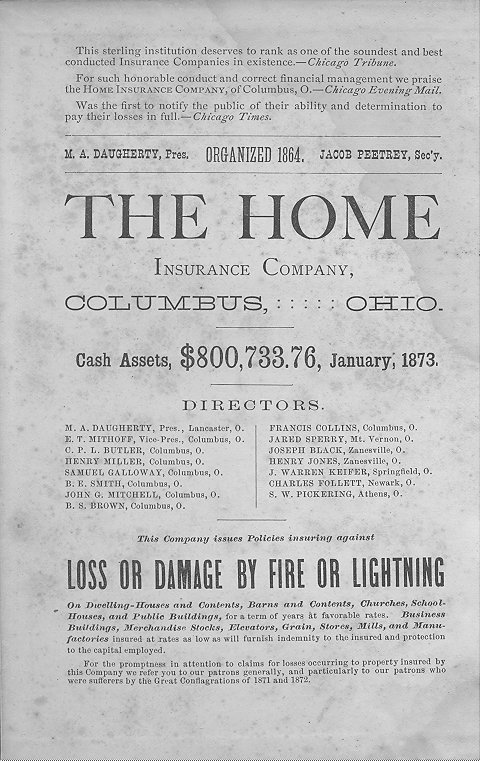
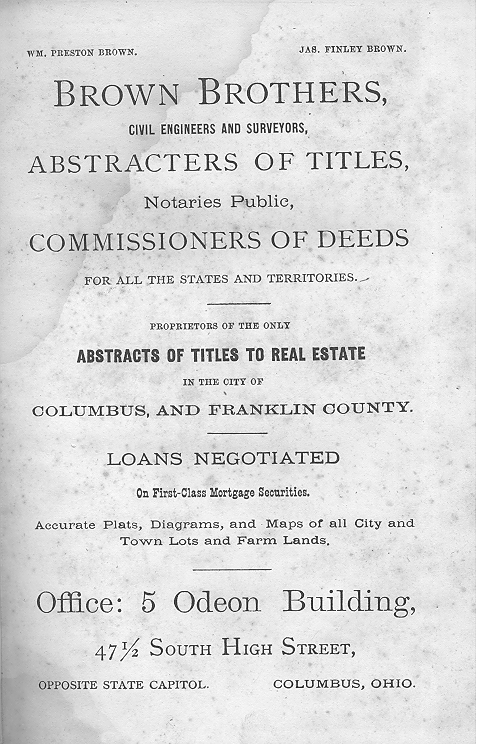
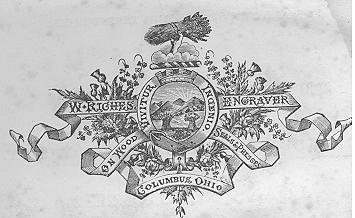
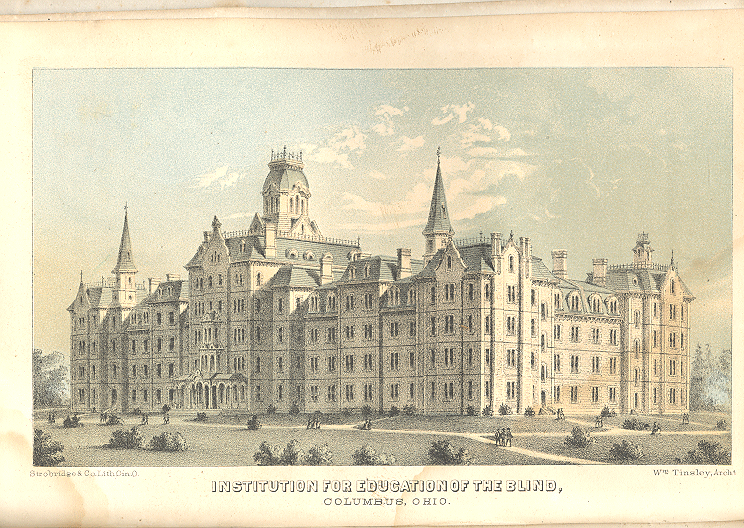
COLUMBUS, OHIO:
ITS
History, Resources, and Progress,
WITH
NUMEROUS ILLUSTRATIONS.
JACOB H. STUDER,
Entered according to Act of Congress, in the year 1873,
By JACOB. STUDER,
In the office of the Librarian of Congress, at Washington, D. C.
![]()
FRANKLIN COUNTY COURTHOUSE, COLUMBUS, OHIO
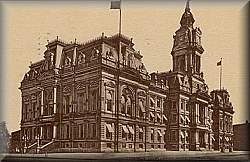 |
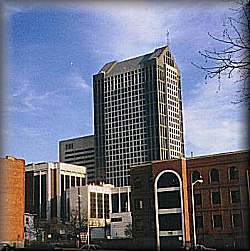 |
|
SEARCH ENGINE When you reach the page you have been referred to by the search engine, search this page by going to the top of your browser, click Edit and then click find on this page. Type in the desired search word and click. This will take you to the places on the page where this word is found. It will take you through all of the places that this word is found on this page
|
Institute for Educating the Blind, Map of the City. Goodale Park German Central School Building, City Market House Gwynne Block, Parker Building, City Park, Hayden's Building Sullivant School Building City Hall, Gay Street Engine House South High Street Engine House City Water Works, Court house, New Infirmary, St. Joseph's Cathedral, Trinity Episcopal Church First Congregational Church Starling Medical College and St. Francis Hospital, Ohio Agricultural and Mechanical College, Academy of St. Mary's of the Springs, Otterbein University, High School Building, Loring School Building, First State Buildings, New State House, New Asylum for Lunatics, New Deaf and Dumb Institute, New Asylum for Idiotic and Imbecile Youth, Masonic Hall, Odd Fellows' Temple, Opera House, First National Bank, Exchange National Bank, Sessions' Block, |
Frontsipiece 24 35 45 55 65 89 96 105 112 131 133 137 144 154 161 175 200 239 260 268 272 282 286 320 331 351 358 363 382 395 337 545 547 549 |
|
CONTENTS CHAPTER I.—Six decades in the history of Columbus; a State capital wanted ; appointment of commissioners to select site; Franklinton talked of report of commissioners; proposals of Starling and others; act accepting proposals and establishing the State capital; Columbus platted; refugee lands; name of capital; direction and width of streets and alleys; first public sale of lots; primitive condition of town; John Brickell's cabin and garden spot; first water-mill and distillery; out-lots laid off; immigration, improvements, and sales of lots; mails carried on horseback; Zinn's mail-coaches; post-office established; first newspaper, first marriage, first saw and flouring mills, jeweler-shop, stores, tavern, school census; market-house, bridge, almanac, the first physician, and the first two churches; street obstructions removed; town incorporated; first bank; first Statehouse built; Public Square cleared of timber; first penitentiary built; removal of seat of government to Columbus; settlement with Starling and company; the articles of association; their agents; the donations they received; the town plat 13 CHAPTER II.—Failure of McLaughlin and Johnston; depression of business; lots sacrificed at forced sales; Starling's title disputed; litigation; claim set up against Kerr and McLaughlin's grantees; legal proceedings; last days of the four original proprietors; basis for a medical college in Columbus; early manufacturing; fate of first saw and flouring mills; patent saw-mill; cotton spinning; new process for dressing flax; woolen factory; steam sawmill; origin of Ridgway's foundry ; United States courthouse built; description; its occupation by the courts; removal of courts to Cincinnati; clerks and marshals; Franklinton the first county-seat; its prosperity and decline; county-seat removed to Columbus; judges of Common Pleas; building for county offices; removal of offices to courthouse; hunting and fishing; call for a grand squirrel-hunt; the result; Ohio Canal begun; De Witt Clinton's welcome to Columbus; his prediction; celebration of commencing the Columbus side-cut; toasts; its completion celebrated; arrival of canal-boats; their joyous welcome; Columbus looking up 25 CHAPTER III.—The cholera in 1833; number of victims ; act for erection of a new State-house; envy; citizens accused of intermeddling with legislative proceedings; new State-house act repealed; removal of State capital agitated; objections to Columbus; subject referred to a committee; reports of the majority and minority; resolution for removal passed by the Senate, but lost in the House; Sullivant's bridges across the Scioto; the franchise bought and a free bridge built; Sandusky Turnpike Road Company incorporated; grant of lands; survey and construction of the road; dispute about the viii - CONTENTS, meaning of the charter; the road a mud pike; toll-gates torn down; repeal of charter; State road established on the route; company seek to recover damages ; additions to Columbus; growth of. the city; population 36 CHAPTER IV.—Road-making era; the Portsmouth turnpike constructed in county sections; the Harrisburg turnpike; county donation ; the Worthington plank-road; the flrst directors; the Sandusky turnpike and plank-road; the Granville plank-road and turnpike; the Grove-port turnpike; the Lockwin plank-road cost per mile; the plank used; the first and second balloon ascensions from Columbus; execution of Clark and of Esther, a colored woman; their crimes; arrest of "Jerry" as a fugitive slave; the claimant and "Jerry's" return to slavery; excitement in consequence; indictment for kidnapping; trial and result; decision of Supreme Court; legal proceedings instituted in Kentucky; how Jerry obtained his freedom ; cholera in 1849; board of health; its report of victims; deaths of well-known citizens; return of cholera in 1850; terror of the citizens; number of fatal cases reported; names of citizens included in the list; cholera in 1853 and 1854; legislation at a stand-still in the sessions of 1848-49 and of 1849-50 ; statement of the dispute in each case; continued growth of Columbus; rapid increase of population; value of real and personal property 42 CHAPTER V.—Opening of the decade; roads and city improvements; first Saengerfest; flag presentation ; exercises in Stewart's Grove; farewell concert and ball; meeting to invite Kossuth; committees appointed; procession on Kossuth's arrival and speeches; reception the next day; Hungarian association; Kossuth's visit and address to the legislature; meeting at the City Hall ; Henry Clay's obsequies; the processions and badges of mourning; meeting of citizens; defalcation in State treasury; resignation of the treasurer; indignation meeting; death of Dr. Kane; remains to pass through Columbus; committees appointed ; State Fencibles; arrival of the remains; deposited in the Senate chamber; exercises there on Sunday; procession to depot on Monday; third balloon ascension by M. Godard; execution of Myers for murder in the penitentiary; his stolidity; war meeting; the resolutions adopted and speeches made; arrival of troops; Camp Jackson; Columbus companies first in the service; appropriation for soldiers' families by the city council ; Columbus surgeons appointed to regiments; Camp Chase established; Camp Thomas; retrospect of decade; slight increase of population; decrease of marriages; western emigration fever; increase in value of real estate; city improved; Broad street; benefit of the war to trade, manufactures, and the general business of the city 54 CHAPTER VI.—Incidents of the war; report of Ladies' Soldiers' Aid Society; its work; exhibition at the High-school building; bazaars at Ambos Hall, at Naughton Hall, and at the Atheneum; provisions brought in from the country for soldiers' families; entertainment at the Opera House; soldiers' homes; object of Tod Barracks; dimensions of the buildings; John Morgan's escape from the penitentiary; his cell and the cells of his six captains; the air-chamber and its construction; how it was entered; tunneling under foundation; getting over the wall; note to the warden; thanksgiving proclamation ; news of Lee's surrender; great rejoicings and grand illumination; thanksgiving turns out a jubilee; procession and speeches; news of President CONTENTS - ix Lincoln's assassination ; tokens of sorrow ; meetings on Sunday ; city council's resolutions; citizen's meeting; action of I. O. O. F.; arrival of the Presidents remains: citizen pall-bearers; the procession, the hearse, and team; the fire department; emblems of mourning; the rotunda; viewing the remains; funeral oration; Sængerbund festival; meeting of citizens ; preparations ; decorations at Schreiner's Hall and elsewhere; flags displayed reception concert; flag presentation; the grand concert; the prize concert; the picnic and ball; council meeting to invite General Grant ; his arrival; the procession ; school children ; the general presented to the people; banquet at the Neil House; interesting documents discovered; railroad conductors in convention ; Humboldt's centennial anniversary; peace celebration; procession; "Peaceful Germania;" exercises at the City Park; Chicago relief meeting; generous subscriptions; ladies' relief meeting; total contributions 72 CHAPTER VII.—Columbus, its growth and prospects; location and brief description; the State-house; other buildings; carpings of the envious; area increased sixfold in nine years; population by wards since 1850 ; ratio of .increase since 1820; comparative increase of city and county; population doubled since 1860; probable future increase; increase of new buildings; a look ahead; Columbus a railroad, manufacturing, and trade center; land cheap, and more dwellings in demand; the city healthy; its superior fire department; its immunity from heavy losses by fire; street railroads, churches, newspapers, and schools; reasons why Columbus should be selected for business and for a residence; investing in real estate in and about the city; city and county statistics; population; agricultural products; live stock; real and personal property; marriages; probate matters; deeds and mortgages; new structures; turnpikes, county buildings, banks, and banking; Franklin compared, as to taxation, with other counties; comparatively low price of lands in and around Columbus; prospects of increase; our facilities for obtaining iron and coal, and advantages for manufacturing; guaranty as to the future; growth of Cities. 97 CHAPTER VIII.—The new City Hall; general description ; the borough of Columbus; borough officers; city of Columbus; councilmen, mayors, recorders, clerks, treasurers, solicitors, surveyors, engineers, clerk of markets, street commissioners, division into wards, finances, value of property ; fire department, alarm telegraph, water-works 112 CHAPTER IX.—Where the courts were first held; the Supreme Court; court in bank; the law library and librarian; clerk of the Supreme Court; its official reporters and judges from Columbus; court of common pleas and its president and associate judges; its judges under the present constitution ; the district court; the superior court and its abolition; the probate court and its judges; common pleas clerks; prosecuting attorneys, sheriff's, coroners, county commissioners, county auditors, county treasurers, county recorders, county surveyors; the title deeds to the court-house site; general description of the court-house and its occupancy; additional building on the south; the first jail; the the present jail; the first county poor-house or infirmary; how it was managed and by whom; an inmate over a century old ; why the location was changed; directors elected; superintendents and physicians; additional grounds purchased; hospitals; alterations and additions to original building; infirmary statistics; a new site and it model infirmary 143 CONTENTS - xi CHAPTER X.—Diocese of Columbus; Catholic churches; Episcopal churches; Methodist Episcopal churches; Presbyterian churches; Congregational churches; Baptist churches; Lutheran churches; Independent German Protestant churches; the Universalist Society; United Brethren in Christ; the Central Christian church ; Hebrew temple cemeteries: Green Lawn, Calvary, Hebrew; the North, old Catholic, andEast grave-yards 161 CHAPTER XI.—Columbus Female Benevolent Society; Industrial schools; Hannah Neil Mission; Woman's Home.; Harec Charity Fund; Hare Orphans' Home; St. Francis Hospital; Douse of the Good Shepherd 227 CHAPTER XII.—The Press—Ohio State Journal, Ohio Statesman, Daily Dispatch, Columbus Gazette, Westbote, Sunday Morning News, Educational Monthly, Odd Fellows' Companion, Lutherische Kirchen Zeiting, Mutes' Chronicle, Ohio Convention Reporter, Lutheran Standard, Algerneine Volkszeitung, Bulletin; the papers of the past; former German papers; miscellaneous papers 242 Agricultural College; Starling Medical College; Capita] University; German Evangelical Lutheran Seminary; Academy of St. Mary's of the Springs; Sisters of Notre Dame; St. Aloysius Seminary; Otterbein University; the public schools; Holy Cross Church and St. Patrick's Church Schools; business colleges 261 State lihrary; public library; circulating library; Tyndal Association 288 CHAPTER XIII.—Agricultural resources; coal ; its production in different countries; what it has done for England; what it is capable of doing for Ohio; where the great coal-field of Ohio lies; Columbus in its relation to the central coal-field; coal and iron may both be used to make it a great city; the great seam of the central field; its extent and thickness; quality of the coal ; its use for household purposes, for steam, for the smelting of iron, and for gas-making; advantages of Columbus for enterprise and the investment of capital; iron; the use of iron the index of civilization and progress; increase in its manufacture and consumption; probable increase of its manufacture in the United States; the share Ohio should take in its production; what advantages Columbus has for becoming an iron city; varieties of iron ore in the Ohio mining region; black band, kidney ore, block ores, etc.; iron ore in the Second Geological district; localities where iron ore is found below the great coal seam, and the analyses of samples; where it is found above that seam, and results of analyses; comparison of the ores with those of the Cleveland district in England; coal, iron, and furnaces in the Hanging Rock iron district; furnace statistics; charcoal and bituminous coal for furnaces; increase of iron in price; the supply falling far short of the demand; Great Britain failing to meet the demand; prospect of success in iron manufacture and trade; Columbus a most eligible point for investment and enterprise in all branches of the iron business 298 CHAPTER XIV.—Erection of the first State-house; its dimensions; inscriptions in verse ; the final doom of the old Capitol ; dirge of the old bell ; property saved and lost; Where succeeding legislative sessions were held; the building for State offices; its description; rooms appropriated to different offices; planting of elm trees; the iron fence; appropriation for a new one; grading and ornamenting the square; the Artesian well ; the new Capitol ; general view; it cost and the time CONTENTS - xi it took to build it; its dimensions, etc.; first building act; the commissioners; beginning of work; plans presented; plans selected; es-. timates of cost; work begun in earnest; corner-stone; deposits in it; Governor Morrow's address; object in view; work suspended, and resumed; active operations; progress of the work under new commissioners, and a new architect; interior work; ventilation and warming; banquet on the opening of the new Capitol; addresses; music and dancing; first legislative session in the new Capitol; completion of work; flag-room; rooms of State Board of Agriculture; Perry's victory; the rotunda floor; the Lincoln memorial ; the statues; asylum for lunatics; purchase of the first site; laying of the cornerstone; description of same; the asylum burned; rebuilding the asylum; a new site; sale of the first site; building a new asylum; description of same; institution for the blind; superintendents; trustees; new building; description of same; statistics of the institution; deaf and dumb institute; description of same; public opening; asylum for idiotic and imbecile youth; purchase of a site; the buildings; bequest; State arsenal ; United States arsenal ; United States post-office; introduction of the penitentiary system into Ohio; building of first penitentiary description; inspectors and keepers; State agent; successive keepers and clerks; prison trades; a rush and escape; what become of the old prison buildings ; litigation about the old penitentiary tract; laid off into lots; appropriation to McLaughlin's widow ; cholera in the prison in 1833 ; its fatality in 1849; the first nine days of the epidemic; physicians called in ; the panic; prisoners let out of cells; no attempt to escape; culmination ; deaths of Drs. Lathrop and Gard; subsidence; number of deaths; the State quarry, its purchase, situation, and general description ; act for a new penitentiary; the first directors and their first report; the site selected; plan of the new building; commencement of work; removal from the old to the new prison; the new system ; cost of the new building; purchase of additional grounds; wardens and clerks; present officers; receipts; present number of prisoners; contracts for convict labor; prison library; religion in the prison 321 CHAPTER XV.—The Masons, Masonic lodges; Knight Templars; Odd Fellows, lodges and encampments; Improved Order of Red Men; Druids, Knights of Pythias, Knighthood, German Beneficial Societies; Catholic German Benevolent Societies; Columbus Typographical Union; Arbeiter Verein, Bile Berith; Knights of St. Crispin; Theodore Parker lodge; United American Mechanics; Butchers' Association; St. Joseph's Mutual Association; Machinists and Blacksmiths' Union; Columbus Ministerial Association; Clerical Aid Society; Preacher's Belief Society; Gruitli Verein; Firemen's Association; Hackmen's Union 382 CHAPTER XVI.—The first theater; State Street Theater; Atheneum; Opera House; musical societies: Meannerchor, Liederkranz, Harmonie, De Beriot Club, Eckhardt Club 433 CHAPTER XVII.—State Board of Agriculture; Horticultural Society; Franklin County Agricultural Society; Trinity Guild; Young Men's Catholic Association; Young Men's Christian Association, and religious societies in general; Franklin County Bar Association; Columbus Turnverein; association of 133d Regiment; German Target Club; Golden Light Lodge; Babbling Brook Lodge; Eureka Degree Temple; Pure Fount Temple of Honor; St. Patrick's Total Abstinence 445 xii - CONTENTS. CHAPTER XVIII.—Columbus railroads; Central Ohio; Columbus and Hocking Valley; Columbus and Ferrara; the Scioto Valley; Columbus and Toledo; Pittsburg, Cincinnati and St. Louis; Pittsburg and Steubenville; Holiday's Cove; Columbus, Piqua and Indiana; Richmond and Covington; Little Miami, and the Columbus and Xenia; Cleveland, Columbus, Cincinnati and Indianapolis, and Springfield Branch, "Bee Line;" Columbus, Springfield and Cincinnati; Cincinnati, Sandusky and Cleveland; Cleveland, Mt. Vernon and Columbus; Columbus and Maysville; Columbus, McArthur and Gallipolis; Columbus and North western 475 CHAPTER XIX.—Columbus Board of Trade; Clinton Bank of Columbus; State Bank of Ohio; Franklin Bank; City Bank; Exchange Bank; the National Banks; private bankers; building and loan associations; fire insurance business; street railroads; Columbus Gas-light and Coke Company 53 CHAPTER XX.—Manufacturing interests; Columbus as the manufacturing center; statistics of the manufacturing industry 563 CHAPTER XXI.—Trade; Columbus wholesale trade; statistics of the trade in the city for 1872. 576 |